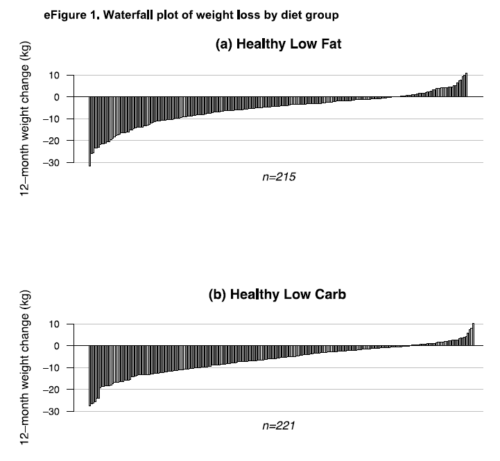Low-fat vs. Low-carb diets: both help cut calories
I subscribe to a newsletter, Obesity and Energetics Offerings, that lists loads of new articles on these topics every week.
One of its offerings is a section titled “Headline vs Study.”
Last week’s was about the paper in JAMA comparing two diets, one featuring healthy carbohydrates and the other healthy fats. Participants in both groups lost equivalent amounts of weight.
- Headline: The Key to Weight Loss is Diet Quality, Not Quantity, a New Study Finds.
- Study: “There was no significant difference in weight change between a healthy low-fat diet vs a healthy low-carbohydrate diet, and neither genotype pattern nor baseline insulin secretion was associated with the dietary effects on weight loss.”
- News Critique: Low Carb, Low Fat, Null Result, Blank Check.
Two other news critiques worth reading:
Overall, this was a well designed study involving about 300 participants in each diet group. On average, participants lost about the same amount of weight regardless of diet composition, but the investigators observed wide variation. Some participants lost a lot of weight—up to 60 pounds—but some gained as much as 20 pounds (data in this figure from the paper are in kilograms).

What accounted for the difference? Calories, of course. If participants didn’t cut calories, they didn’t lose weight. The investigators estimated that weight-losing participants were eating a lot fewer calories than they used to, even though they were not instructed to pay attention to calories.
But, as Weighty Matters discusses (based on Daniel Schultz’s tweets noted above), some participants did count calories (they used an online fitness tool).
The bottom line? It’s easier to cut calories and lose weight if you eat a healthy diet, no matter what the proportion of fat v. carbohydrate.
As NIH scientist Kevin Hall tweeted, these findings are consistent with previous studies:

And as Mal Nesheim and I argued in our book “Why Calories Count: From Science to Politics,” calories matter but counting them is not always helpful when dieting. It’s too inaccurate, and regular weighing works better as a monitoring tool. So, according to this study, is eating healthfully.

